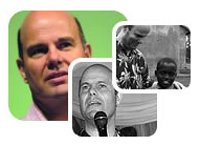 Mark has been involved in some cross-party meetings at Westminster on the issue of fatherlessness in British society. He also mentioned that he is working towards creating a DVD of 'The Running Father' as a gift to every athlete at the 2012 London Olympics.
Mark has been involved in some cross-party meetings at Westminster on the issue of fatherlessness in British society. He also mentioned that he is working towards creating a DVD of 'The Running Father' as a gift to every athlete at the 2012 London Olympics.He introduced his subject by describing the adventures of 'Lawnchair Larry' who spectacularly went to 'the next level' in 1982.
In Mark 2:1-12 we see how the faith of the paralysed man's friends led them to 'go to the next level' in getting him before Jesus. We need three things to go to a new level in our lives, faith, friends and foes. Faith and friends are obvious, foes often irritate us like the thorns in the eagle's nest. The young bird might never try to fly if the nest remained cosy and comfortable.
Forgiveness - The man is forgiven first. Jesus speaks of his healing later, but first he announces that he is forgiven.
Freedom - After forgiveness he receives freedom - freedom to stand up, freedom to walk about. Can you imagine that freedom after many years of imprisonment in a body that is paralysed?
Fulfilment - The need to pick up the mat is prophetic, it's not an accidental detail, Jesus told him, 'Pick up your mat'. But why? The man is healed, he no longer needs his mat! In picking up the mat he is taking hold of the very thing that had previously taken hold of him. Instead of having to lie on his mat, now he is able to pick it up.
Finishing - It's so important to finish well. He can go home now. Jesus tells him, 'Pick up your mat and go home.' We need to finish well. When we're done people need to say, 'We've never seen it done like this before!' (verse 12)
See also:
- Notes on other sessions from this conference
- The Father's House Trust website (you may find the 'Media' and 'Shop' especially useful).






